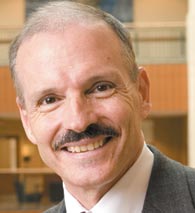|
Executive Interviews: Interview with Roland T Rust on Co-Creation
March 2010
-
By Dr. Nagendra V Chowdary
 Roland T Rust
Roland T Rust Distinguished University Professor and David Bruce Smith Chair in Marketing at the Robert H Smith School of Business at the University of Maryland, 
It is quite often argued that customers
are the new competitors to the
companies? Where has this
phenomena been witnessed and how
engulfing shall this phenomena be?
What precautions do you think
companies should take to preempt
any such unforeseen competitive
threats?
This can certainly be the case for
product distribution, especially with
digital content. With music, the
customers have already won. The
case of movies is now rapidly
approaching. What music shows us
is that it is not just individual
customers who are competitors, but
also customers networked together by
social media.
This can certainly be the case for
product distribution, especially with
digital content. With music, the
customers have already won. The
case of movies is now rapidly
approaching. What music shows us
is that it is not just individual
customers who are competitors, but
also customers networked together by
social media.
Both are examples of two-way
information flow between the
company and the customer. In the
Olayforyou.com example, it is made
possible by information technology.
Both are examples of two-way
information flow between the
company and the customer. In the
Olayforyou.com example, it is made
possible by information technology.
The key is facilitating two-way
information flows, and then building
a mechanism for customer
information to inform what the
company is doing. In its purest form,
adaptive personalization systems, the interactivity has an immediate effect
on the service provided. The service
learns and evolves.
interactivity has an immediate effect
on the service provided. The service
learns and evolves.
Ultimately, the company is turned
upside down, from product/brandcentered
to customer-centered. The
organization is structured around
customers and customer segments
instead of around products and
brands. Such a profound
transformation is not possible
without guidance from the top.
Did you observe any co-creation
attempts from emerging economies’
companies? Do you suggest
companies from emerging economies
should also look at co-creation as
their next frontier of invading through
consumer markets?
In many ways emerging economies
will find co-creation more natural
than the developed economies do.
This is because pre-industrial
societies have always had co-creation
and personalization, because there
was no mass production. The key
will be to skip the industrialization
step and go directly to a technologyenabled
co-creation approach, which
is more powerful and efficient.
When confrontedwith a collective
“What’s in it for us” from the
potential customers (those who are
intended to be tapped for co-creation
exercise), what should be the
companies’ sales pitch?
When confrontedwith a collective
“What’s in it for us” from the
potential customers (those who are
intended to be tapped for co-creation
exercise), what should be the
companies’ sales pitch?
What would innovation mean in
the light of co-creation attempts?
What changes do you foresee on
companies’ innovation efforts?
Innovation still requires the creative
leap. The only difference is that the
information available for making the
creative leap is more extensive. The
customer’s voice is clearer.
The Interview was conducted by Dr. Nagendra V Chowdary, Consulting Editor, Effective
Executive and Dean, IBSCDC, Hyderabad. This Interview was originally published in Effective Executive, IUP, March 2010. Copyright © March 2010, IBSCDC
No part of this publication may be copied, reproduced or distributed, stored in a retrieval
system, used in a spreadsheet, or transmitted in any form or medium – electronic,
mechanical, photocopying, recording, or otherwise – without the permission of IBSCDC. |
